- Home
- Paulo Coelho
Manuscript Found in Accra Page 6
Manuscript Found in Accra Read online
Page 6
The lover thinks: “My beloved is mine and I am his. And in the broad ways I sought him but found him not. With every corner I pass and with each person I ask and who fails to answer my questions, I allow the normal anxiety of love to be transformed into despair.”
The worker, while he awaits the fruits of his labors, tries to occupy himself with other tasks, each of which will bring him more moments of waiting. It will not be long before each single anxiety has combined to become one large anxiety, and he can no longer see the sky or the stars or his children playing.
And mother, lover, and worker alike all cease living their lives and simply expect the worst; they listen to rumors and complain that the day seems never-ending. They become aggressive with friends, family, and employees. They eat badly, either consuming too much or being unable to keep anything down. And at night, they lay their head on the pillow, but cannot sleep.
That is when anxiety weaves a veil through which only the eyes of the soul can see.
And the eyes of the soul are bleary with tiredness.
At that point, in walks one of humankind’s worst enemies: obsession.
Obsession arrives and says:
“Your fate now belongs to me. I will make you look for things that do not exist.
“Your joy in living belongs to me, too. From now on, your heart will know no peace because I will drive out enthusiasm and take its place.
“I will allow fear to spread throughout the world, and you will always feel afraid, but without knowing why. You don’t need to know; you just need to stay afraid and feed and fatten your fear.
“Your work, which was once an Offering, has also been taken over by me. The others will say that you set a fine example because you drive yourself so hard, and you will smile and thank them for the compliment.
“But in your heart, I will be saying that your work is now mine, and I will use it to distance you from everything and everyone—from your friends, from your son, from yourself.
“Work harder, so you won’t have to think. Work harder than you need to, so that you can stop living altogether.
“Your Love, which was once a manifestation of the Divine Energy, belongs to me, too. And the person you love will be unable to leave your side for a moment, because I am there in your heart, saying: ‘Careful, she might go away and never come back.’
“Your son, who once would have followed his own path in the world, will now be mine as well. I will have you surround him with unnecessary worries that destroy his taste for adventure and risk, that make him suffer whenever he displeases you, and that leave him feeling guilty because he has failed to live up to your expectations.”
Therefore, although anxiety is part of life, never let it control you.
If it comes too close, say: “I’m not worried about tomorrow, because God is there already, waiting for me.”
If it tries to persuade you that taking on lots of jobs means having a productive life, say: “I need time to look at the stars in order to feel inspired and to be able to do my job well.”
If it threatens you with the ghost of hunger, say: “Man does not live by bread alone, but by every word that proceeds out of the mouth of God.”
If it tells you that your beloved might not come back, say: “My beloved is mine, and I am hers. She is grazing her flocks by the river, and I can hear her singing, even from afar. When she returns home, she will be tired and happy, and I will make her some food and watch over her sleep.”
If it tells you that your son has no respect for the love you lavished on him, answer: “Excessive caution destroys the soul and the heart, because living is an act of courage, and an act of courage is always an act of love.”
That way you will keep anxiety at bay.
It will never disappear, but the great wisdom of life is to realize that we can be the masters of the things that try to enslave us.
And a young man said:
“Tell us what the future holds.”
And he answered:
We all know what awaits us in the future: the Unwanted Visitor, who could arrive at any hour, without warning, and say: “Come with me.”
And however much we may not want to, we will have no choice. At that moment, our greatest joy, or perhaps our greatest sadness, will be to look back at the past and answer the question: “Did I give enough love?”
We must love. I am not speaking only of love for another person. Loving means being open to miracles, to victories and defeats, to everything that happens each day that was given us to walk upon the face of the Earth.
Our soul is governed by four invisible forces: love, death, power, and time.
We must love because we are loved by God.
We must be aware of the Unwanted Visitor if we are fully to understand life.
We must struggle in order to grow, but without becoming trapped by whatever power we might gain from that growth. We know that such power is worthless.
Finally, we must accept that our soul, although eternal, is, at this moment, caught in the web of time, with all its possibilities and limitations.
Our dream, the desire that is in our soul, did not come out of nowhere. Someone placed it there. And that Someone, who is pure love and wants only our happiness, did so only because he also gave us the tools to realize our dreams and our desires.
When you are going through difficult times, remember: you might have lost some major battles, but you survived and you’re still here.
That is a victory. Show your happiness and celebrate your ability to go forward.
Pour your love generously out onto the fields and pastures, down the streets of the big city and across the dunes of the desert.
Show that you care about the poor, for they are an opportunity for you to display the virtue of charity.
And care, too, about the rich, who distrust everything and everyone, keeping their granaries crammed with grain and their coffers full, but who, despite all that, cannot drive away loneliness.
Never miss an opportunity to show your love, especially to those close to you, because we are always at our most cautious with them for fear of being hurt.
Love—because you will be the first to benefit. The world around you will reward you, even if, at first, you say to yourself: “They don’t understand my love.”
Love does not need to be understood. It needs only to be shown.
Therefore, what the future holds for you depends entirely on your capacity for love.
And for that you must have absolute and total confidence in what you are doing. Don’t let others say: “That road is better” or “That route is easier.”
The greatest gift God gave us is the power to make decisions.
We were all told from childhood that what we wanted to do was impossible. As we accumulate years, we also accumulate the sand of prejudices, fears, and guilt.
Free yourself from that. Not tomorrow, not tonight, but now.
As I said: many of us believe that we will hurt those we love if we leave everything behind in the name of our dreams.
But those who truly want the best for us want us to be happy, even if they can’t understand what we are doing, and even if, at first, they try to stop us from going ahead by means of threats, promises, and tears.
The adventure of the days to come needs to be filled with romance, because the world needs that; therefore, when you are mounted on your horse, feel the wind on your face and enjoy the sense of freedom.
But don’t forget that you have a long journey ahead. If you surrender totally to the romance of it all, you might fall. If you don’t stop occasionally to let both you and your horse rest, your horse might die of thirst or exhaustion.
Listen to the wind, but don’t forget about your horse.
And precisely when everything seems to be going well and your dream is almost within your grasp, that is when you must be more alert than ever. Because when your dream is almost within your grasp, you will be assailed by terrible guilt.
You will see that you are about to arrive at a place where very few have ever set foot, and you will think that you don’t deserve what life is giving you.
You will forget all the obstacles you overcame, all that you suffered and sacrificed. And because of that feeling of guilt, you could unconsciously destroy everything that took you so long to build.
That is the most dangerous of obstacles, because renouncing victory has about it a certain aura of sanctity.
But if a man understands that he is worthy of what he has struggled so long for, he will realize that he did not get there alone and must respect the Hand that led him.
Only someone capable of honoring each step he takes can comprehend his own worth.
And a man who knew how to write, and who was frantically trying to note down every word the Copt said, paused to rest, feeling as if he were in a kind of trance. The square, the weary faces, the religious men who were listening in silence, all seemed part of a dream.
And in order to prove that what he was experiencing was real, he said:
“Speak to us about loyalty.”
And he answered:
Loyalty can be compared to a shop selling exquisite porcelain vases, a shop to which Love has given us the key.
Each of those vases is beautiful because it is different, as is every person, every drop of rain, every rock sleeping on the mountainside.
Sometimes, due to age or some unsuspected defect, a shelf collapses and falls. And the shop owner says to himself: “I invested years of my time and my love on this collection, but the vases have betrayed me and broken.”
The man sells his shop and leaves. He becomes a solitary, embittered individual, believing that he will never trust anyone again.
It’s true that some vases do break—a promise of loyalty broken. In that case, it’s best to sweep up the pieces and throw them away, because what was broken will never be the same again.
But sometimes the reasons why a shelf collapses and falls go beyond mere human intentions: it could be an earthquake, an enemy invasion, or clumsiness on the part of someone who enters the shop without looking where he is going.
Men and women blame each other for the disaster. They say: “Someone should have foreseen what was going to happen.” Or: “If I had been in charge, these problems could have been avoided.”
Nothing could be further from the truth. We are all prisoners of the sands of time, and we have no control over them.
Time passes, and the shelf that fell gets mended.
Other vases fighting for their place in the world are put there. The new shop owner, who understands that nothing lasts, smiles and says to himself: “That tragedy opened up an opportunity for me and I will try to make the most of it. I will discover works of art I never even knew existed.”
The beauty of a shop selling porcelain vases is that each vase is unique, but, when they are placed side by side, the vases exude harmony and reflect the hard work of the potter and the art of the painter.
Each work of art could easily say: “I want to be noticed, and I’m going to get out of here.” But the moment it tries to do that, it will be transformed into a pile of broken shards with no value.
And as it is with vases so it is with men and women.
And so it is with tribes and ships and trees and stars.
Once we understand this, we can sit next to our neighbor at the end of the day, listening with respect to what he has to say and saying what he needs to hear. And neither of us will try to impose our ideas on the other.
Beyond the mountains that separate the tribes, beyond the distance that separates bodies, there exists the community of spirits. We are part of that community, where there are no streets peopled with pointless words, only broad avenues that connect what is distant and sometimes have to be repaired because of the damage caused by time.
Thus, the returning lover will never be eyed with distrust, because loyalty accompanies his every step.
And the man who was seen as an enemy yesterday, because there was a war being waged, will now be seen as a friend, because the war is over and life goes on.
The son who left will eventually return, and he will return rich in the experiences he had along the way. His father will receive him with open arms and say to his servants: “Bring the best robe for him and put a ring on his finger and sandals on his feet, because my son was dead and is alive again. He was lost and is found.”
And a man whose brow was marked by time and whose body was marked by scars that told of the battles in which he had fought said:
“Speak to us of the weapons we must use when all is lost.”
And he answered:
Where there is loyalty, weapons are of no use.
All weapons are instruments of evil because they are not the instruments of the wise man.
Loyalty has its roots in respect, and respect is the fruit of Love. Love drives out the demons of the imagination—which distrust everything and everyone—and, instead, returns purity to our gaze.
When a wise man wants to make someone weak, he first makes that person believe that he is strong. The other man will then fall into the trap of challenging someone even stronger and be destroyed.
When a wise man wants to bring someone low, he first makes that person climb the highest mountain in the world to allow him the illusion that he is very powerful. The other man will then believe that he can go still higher and plunge into the abyss.
When a wise man covets something that belongs to another man, he loads him with gifts. The other man will have so many useless objects to take care of that he will lose everything else, too busy trying to keep what he thinks he owns.
When a wise man cannot discover what his opponent is planning, he feigns an attack. We are always prepared to defend ourselves, because we all live with the fear and paranoia that other people don’t like us.
His opponent—however brilliant he may be—is insecure and reacts with excessive violence to the provocation. In doing so, he reveals what weapons he has, and the wise man thus discovers what his opponent’s strong and weak points are.
Then, knowing exactly what kind of reaction to expect, the wise man either attacks or retreats.
This is how those who appear submissive and weak conquer and defeat those who are powerful and strong.
And so wise men often defeat warriors, but warriors also defeat wise men. To avoid this, it is best to seek the peace and repose that exist in the differences among human beings.
The wounded person should ask himself: “Is it worth filling my heart with hatred and dragging the weight of it around with me?”
He is thus making use of one of Love’s qualities—namely, Forgiveness. This helps him to rise above all the insults spoken in the heat of battle, insults which time will soon erase just as the wind erases footsteps from the sands of the desert.
When you forgive, the person who insulted you feels humbled in his error and becomes loyal.
Let us, therefore, be aware of the forces that move us.
The true hero is not the man who was born for great deeds, but the one who has managed to build a shield of loyalty around him out of many small things.
Thus, when he saves his adversary from certain death or from betrayal, his gesture will never be forgotten.
The true lover is not the one who says: “You need to be by my side and I need to take care of you, because we are loyal to each other,” but the one who realizes that loyalty must go hand in hand with freedom. And without fear of betrayal, he accepts and respects the other person’s dream, trusting in the greater power of Love.
The true friend is not the one who says: “You wounded me today, and I am sad.”
He says: “You wounded me today for reasons unknown to me and possibly to you as well, but tomorrow I know that I will be able to count on your help. And so I will not be sad.”
And the friend responds: “You are a loyal friend, because you said what you felt. There is nothing worse than a friend who confuses loyalty with accepting our every fault.”
The most destructive of weapons is not the spear or the siege cannon, which can wound a body and demolish a wall. The most terrible of all weapons is the word, which can ruin a life without leaving a trace of blood, and whose wounds never heal.
Let us, then, be masters of our tongue and not slaves of our words. Even if words are used against us, let us not enter a battle that cannot be won. The moment we place ourselves on the same level as some vile adversary, we will be fighting in the dark, and the only winner will be the Lord of Darkness.
Loyalty is a pearl among grains of sand, and only those who really understand its meaning can see it.
Thus the Sower of Discord can pass the same spot a thousand times and never see the little jewel that keeps those who need to remain united.
Loyalty can never be imposed by force, fear, insecurity, or intimidation.
It is a choice that only strong spirits have the courage to make.
And because it is a choice, it will never tolerate betrayal, but will always be generous with mistakes.
And because it is a choice, it withstands time and passing conflicts.
And one of the young men in the audience, seeing that the sun was almost below the horizon and that soon this encounter with the Copt would come to an end, asked:
“And what about enemies?”
And he answered:
The truly wise do not grieve over the living or the dead. Therefore, accept the battle that awaits you tomorrow because we are made of the Eternal Spirit, which often places us in situations that we need to confront.
At such moments, set aside all futile questions, because they merely slow down the warrior’s reflexes.
A warrior on the battlefield is fulfilling his destiny, and he must surrender himself to that. Pity those who think they must kill or die! The Divine Energy cannot be destroyed; it simply changes its form. The wise men of Antiquity said:

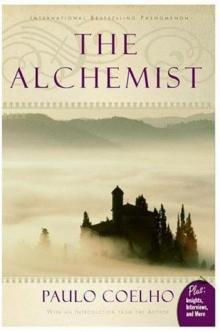 The Alchemist
The Alchemist Maktub
Maktub Like the Flowing River
Like the Flowing River The Winner Stands Alone
The Winner Stands Alone The Spy
The Spy By the River Piedra I Sat Down and Wept: A Novel of Forgiveness
By the River Piedra I Sat Down and Wept: A Novel of Forgiveness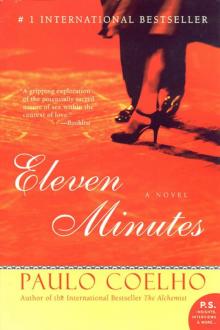 Eleven Minutes
Eleven Minutes Manuscript Found in Accra
Manuscript Found in Accra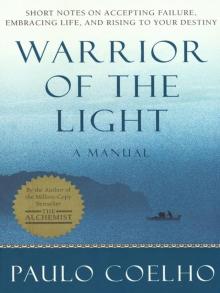 Warrior of the Light
Warrior of the Light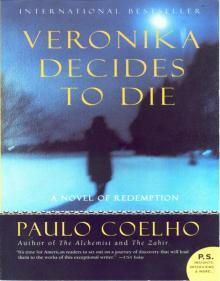 Veronika Decides to Die: A Novel of Redemption
Veronika Decides to Die: A Novel of Redemption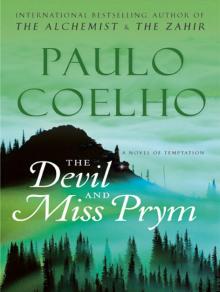 The Devil and Miss Prym: A Novel of Temptation
The Devil and Miss Prym: A Novel of Temptation The Valkyries: An Encounter With Angels
The Valkyries: An Encounter With Angels Brida: A Novel
Brida: A Novel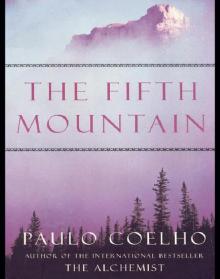 Fifth Mountain: A Novel
Fifth Mountain: A Novel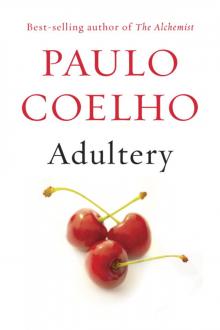 Adultery
Adultery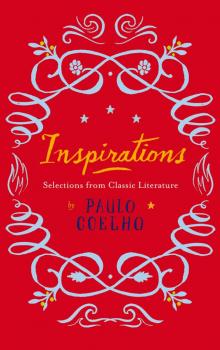 Inspirations
Inspirations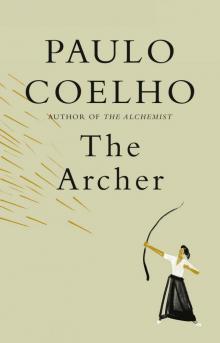 The Archer
The Archer The Witch of Portobello
The Witch of Portobello The Pilgrimage
The Pilgrimage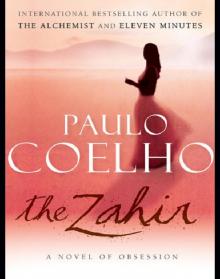 The Zahir
The Zahir Brida
Brida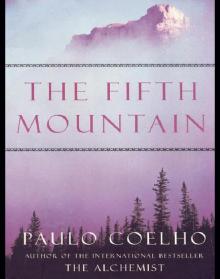 The Fifth Mountain
The Fifth Mountain Like the Flowing River: Thoughts and Reflections
Like the Flowing River: Thoughts and Reflections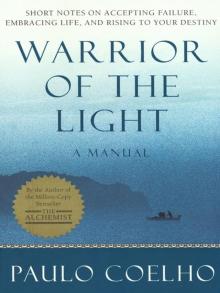 Manual of the Warrior of Light
Manual of the Warrior of Light By The River Piedra I Sat Down & Wept
By The River Piedra I Sat Down & Wept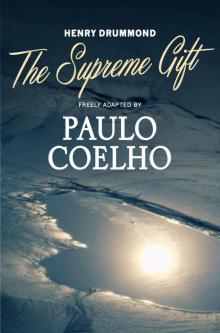 The Supreme Gift
The Supreme Gift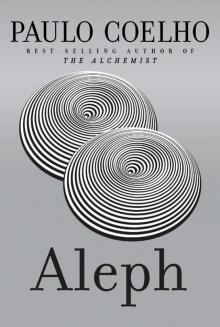 Aleph
Aleph Hippie
Hippie Witch of Portobello
Witch of Portobello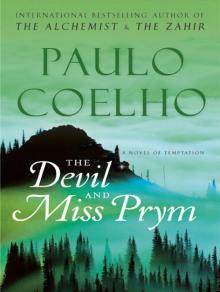 The Devil and Miss Prym
The Devil and Miss Prym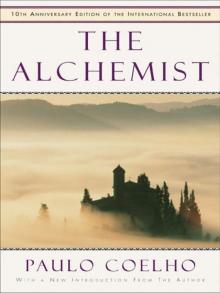 The Alchemist - 10th Anniversary Edition
The Alchemist - 10th Anniversary Edition The Valkyries
The Valkyries